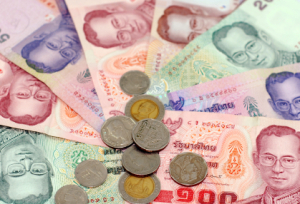Dollars? Rupees? Yuan? Baht? Riyals? Euros? Pounds?
What is your local currency called and what is it worth?
Money goes far in Thailand – it is one of the many great things about studying and living in Thailand. You can often get a nice meal for just a couple of dollars at a restaurant, and traveling from one side of the country to the other is very inexpensive.
The local currency in Thailand is called “baht”. Check out the video below to learn about each coin and bill used in Thailand.

Accessing your money abroad:
We recommend using your banking card (ATM/debit) from your U.S. bank. Using ATM cards enables you to access your own personal bank account from any ATM machine around the world. The primary advantages of getting money from an ATM are 24-hour access and preferential exchange rates. To see the current Baht to US Dollar exchange rate click here: www.xe.com
IMPORTANT INFORMATION ABOUT USING YOUR DEBIT CARD ABROAD:
Check with your bank to make sure you can use your card overseas, and to inform them that you will be living abroad. Give them your dates, and all the countries you anticipate traveling to. It is not uncommon to be cut off from your bank account after using your card abroad, even after giving them forewarning. If this happens, don’t panic! Banks do this to protect their clients, and we should be grateful! If this happens to you, you just need to contact your bank to ensure them that you are in possession of your card and that you need to have access to your account while you are abroad. If you have a shared account with a family member and their name is also on the account, sometimes it’s helpful to get word to them to call the bank for you, considering the time difference between countries.
In order to withdraw cash from an ATM using a debit or credit card, you must have a 4-digit pin. While you’re most likely very familiar with your debit PIN, you might not know a PIN for your credit card. Be sure to ask before you travel, banks will not release this information over the phone, via text, through an email or in any other way than to mail your PIN to the mailing address associated with your account.
Many ATMs only accept debit/credit cards that have the Cirrus, Plus, Visa, MasterCard, or American Express symbol on the back of the card. It is a good idea to have both options available – an ATM card and a credit card – just in case of an emergency. When you use your bank card, the ATM machine will automatically convert the money into the local currency for you. Please ask your bank about their fees associated with international transactions, they may charge you anywhere from $5.00 to $7.00 per transaction, and that adds up!
